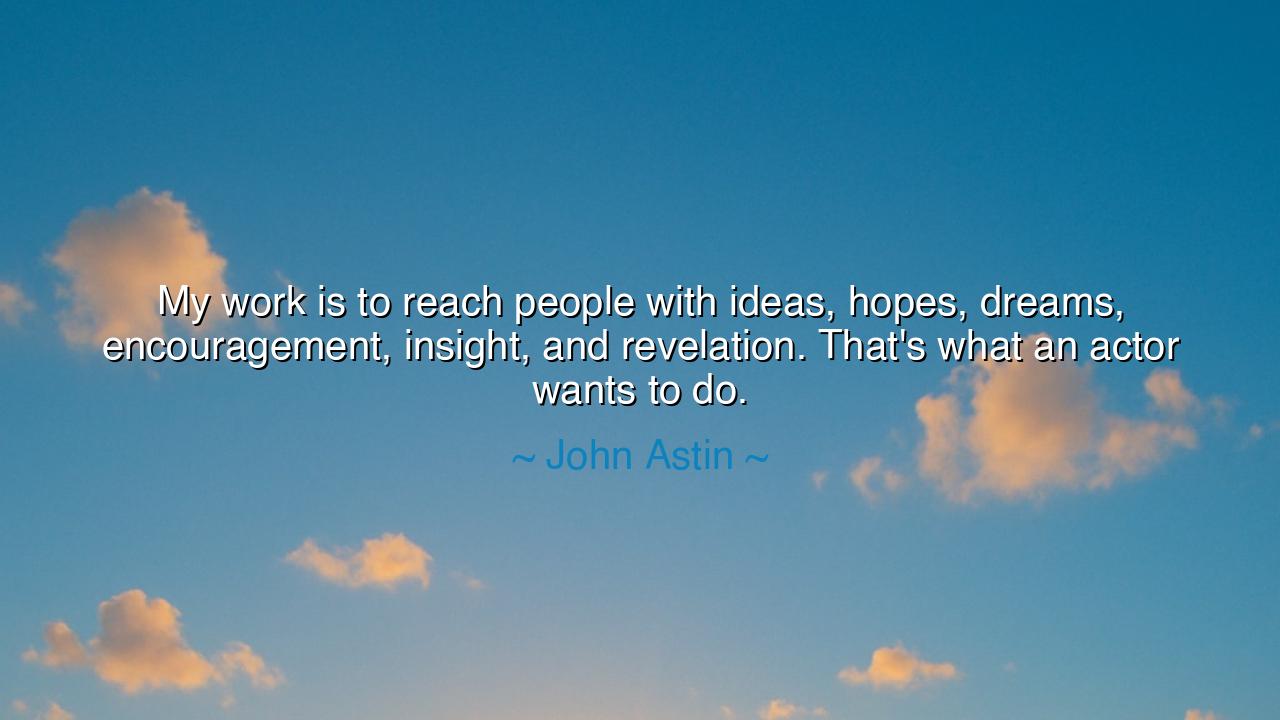
My work is to reach people with ideas, hopes, dreams
My work is to reach people with ideas, hopes, dreams, encouragement, insight, and revelation. That's what an actor wants to do.






“My work is to reach people with ideas, hopes, dreams, encouragement, insight, and revelation. That’s what an actor wants to do.” – John Astin
Listen well, O seeker of meaning, to the words of John Astin, a master of stage and screen whose art carried both laughter and depth. Though remembered by many for the shadows and smiles he conjured as Gomez Addams, these words unveil a truth far greater than the roles he played. Here he speaks not as a performer of lines, but as a servant of humanity’s spirit—for when he says, “My work is to reach people with ideas, hopes, dreams, encouragement, insight, and revelation,” he declares the sacred purpose of all true art: to awaken what sleeps within the human soul.
For the actor, as Astin reveals, is no mere entertainer. He is a vessel through which truth is made visible, emotion made living, and the unseen given form. His work is not to mimic life, but to reflect it with such honesty that those who watch are changed by it. In this, the actor stands in the lineage of the ancient storytellers, the poets and prophets who once gathered tribes around the fire to share tales of gods and heroes, love and loss. From the masks of Greek tragedy to the flickering screens of the modern age, the purpose has remained the same: to reach people, to bridge the distance between one soul and another through the language of dreams and revelation.
When Astin speaks of sharing ideas and hopes, he reminds us that art is not only reflection—it is renewal. The actor’s work gives courage to the weary, vision to the lost, and laughter to those who have forgotten joy. In the ancient theaters of Athens, when Sophocles staged the tragedy of Oedipus Rex, the audience did not leave merely entertained; they left enlightened. Through suffering and insight, they learned the laws of fate and the cost of pride. In the same way, when a modern actor embodies truth, even through comedy, he gives to his audience not illusion, but understanding. He holds a mirror before them—not to mock, but to reveal.
John Astin’s words remind us that the actor’s power lies in empathy. To perform is to live many lives, to carry the weight of countless souls within one’s own. Through each role, the actor becomes the beggar and the king, the saint and the sinner, the broken and the redeemed. By inhabiting their worlds, he learns what it means to be fully human—and in sharing that discovery, he teaches others to see themselves with compassion. The actor’s art, then, is not deception—it is communion. It is the act of saying, “You are not alone; I, too, have felt this.” And in that moment of shared emotion, hearts are healed, and the boundaries between self and other dissolve.
In this, Astin’s philosophy finds kinship with the greatest teachers and visionaries. For what is the goal of Socrates, of Buddha, of Christ, if not to reach people with insight and revelation? What are their parables, their dialogues, their sermons, if not performances of the spirit meant to awaken truth in those who hear them? The actor, too, serves as a messenger—an ambassador of the eternal themes: love, loss, courage, forgiveness, and the ceaseless search for meaning. Through story, the actor transmits wisdom in a form the heart can receive, clothed in emotion and memory rather than cold philosophy.
Consider, for example, the life of Charlie Chaplin, whose silent films spoke more eloquently than words ever could. Through the tramp’s ragged coat and clumsy shoes, Chaplin brought forth both laughter and sorrow. He reminded the world, amid the machinery and cruelty of his age, that the human heart could still feel tenderness, still dream, still hope. Like John Astin, he understood that the actor’s highest calling is to encourage, to give back to humanity a reflection of its own beauty, even when the world seems dark. In doing so, he became not just an entertainer, but a healer of the human condition.
And so, my child of art and aspiration, learn from these words of Astin: whatever your craft—whether you paint, write, teach, or simply live—your purpose is the same: to reach people. To speak to their better angels, to awaken in them the dreams they have forgotten, to offer hope where there is despair, and to reveal the light that hides within all darkness. The actor does this upon the stage, but you may do it in your daily life—through kindness, through honesty, through the courage to express what is true. For all the world, as Shakespeare said, is a stage, and each of us a player. The question is not whether we will act, but whether we will act with love.
Thus, remember this final truth: the greatest performance is not in the theater, but in the world itself. When you live with sincerity and passion, when your words carry insight and your actions bring encouragement, you fulfill the very calling John Astin described. You become both artist and audience, both teacher and student. And in doing so, you join the eternal chorus of those who, through their lives and labors, strive to touch the hearts of others—and in so doing, keep the sacred fire of hope alive for all mankind.






AAdministratorAdministrator
Welcome, honored guests. Please leave a comment, we will respond soon